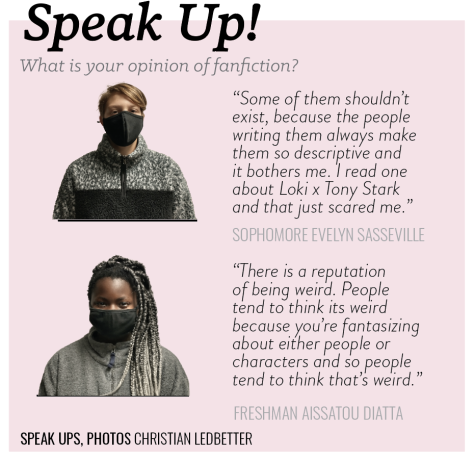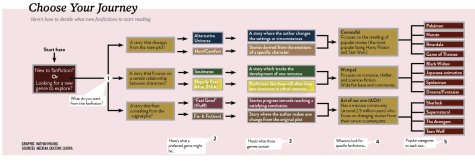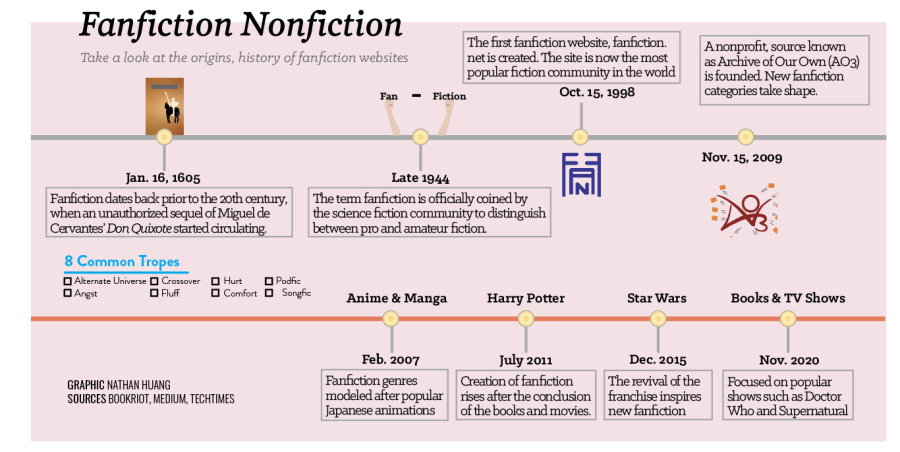A World of Fantasy
Students, teachers, offer opinions on fan fiction, fan culture
Senior Olivia Rohan likes to spend her free time reading or writing fanfiction, particulary fanfiction from the Japanese role-playing game series “Mother”, localized as “Earthbound”, which hasn’t had a new release since 2006.
Rohan said her enjoyment of fanfiction comes from belonging to a lot of fan communities that have gone dormant, with a lack of content in recent years and the ability to have new content. “You just want more content. You want more of the same characters and maybe even some new ones and new stories, new anything.”
Rohan said she liked the opportunity creating fanfiction provides fans to imagine or interpret continuation of series or characters that wouldn’t otherwise be continued. Among the sub-genres of fanfiction she said she enjoys, Rohan specified fix-it fics, where authors alter a story’s main conflict to see where the story would turn if a different conflict arose instead. Another sub-genre was canon alteration.

“I really like canon alterations because in the ‘Mother’ series, (which) has been dead for at least 15 years, you read these canon alterations and this crazy stuff where these people, they got so inspired by this series and they just ran with it. ‘I have an idea. It isn’t in line with canon. What if this happened instead?’”
IB English teacher Austin Flynn said he read Harry Potter fanfiction in high school following the release of Harry Potter and the Half-Blood Prince.
“I read the sixth book,” he said. “I did the midnight release and just that anticipation for the seventh book, I just wanted more and I wanted to get a sense of all the ways that the story could wrap up, things that could happen. There’s a lot of comfort in that. There was a sense of a community with everyone who obviously heard about the IP as well and wanted to make the story grow.”
While both Rohan and Flynn said fanfiction offered opportunities for fans to celebrate the stories and characters they loved, Rohan said it could at times get out of hand.
“There’s a whole, really tangled web of people and ideas that make up a fandom and what typically ends up happening is that humans, we have priorities; we know what we like and most of the time a lot of us happen to like these crazy romance stories that have nothing to do with an actual story,” she said. “Those are the most popular things. If you go to any fanfiction site like Wattpad, Archive of Our Own (AO3), honestly, Tumblr, and you look up a fanfiction tag for a certain fandom or something, the top of the list is always going to be a romance shipping (story.)”

According to an article from Vox, “shipping” is when members of a fan community root or speculate about the romantic potential between characters from a piece of media. Most works of fanfiction tend to involve shipping to some degree, with popular fanfiction site AO3 offering a search by relationship tab and Tumblr, another site, listing its top 100 searched ships in annual year reviews.
According to Rohan, most ships tends to focus on same sex couples, which comes from a lack of LGBTQ+ representation in more institutional works of media; however, she said it has gotten to the point of oversaturation.
“People are like, ‘Here is this one character, the main character, and here is this side character that has nothing to do with this character,’ and they’re shipping them for the sake of them being the same gender or something. It’s honestly to the point of fetishization.”
Florian Foster, Just Write Club leader and senior, said he agreed with that sentiment.
“It’s somewhat disturbing sometimes to be in some fan spaces because there is a lot of fetishization and squashing any character into a box of boy 1, boy 2 and just smashing them together with no regard for character traits or previous story or anything like that,” he said.
Flynn, however, had a different perspective on this controversy.
“I’m just glad people are writing,” he said. Honestly. I think there is a lot, whether fanfiction writers realize it or not. There is so much analisis that goes into that. If an author is trying to get close to the style or the voice of the individual author, think about the level of attention to syntax and structure and how those characters speak. There is so much that goes into writing it well.”
He said that a number of authors, such as the Hugo-award-shortlisted author Tamsyn Muir, got their start in fanfiction and that the practice offered writers an opportunity to develop a voice for characters who already existed.
However, though authors such as Muir have gotten success through writing fanfiction, many authors criticize the practice, with writers like George R. R Martin, best known for the Song of Ice and Fire series, later adapted for TV as “Game of Thrones’’, calling it bad practice for writers. Other writers, such as J.K. Rowling and Stephenie Meyer, best known for Harry Potter and Twilight respectively, said they approve of fanfiction of their work.
Flynn said his mind often changed on the issue, though he did see it as a sign of respect.
“I think (for a writer) there is a certain kind of ownership that needs to happen,” he said. “It’s their story. They’re the ones telling it and I think for individuals to write, in that world, I think it is paying respect to them. I think – and I don’t know if this is where the conversation could go – but I think individuals or fans taking ownership of the characters of the ideas, I think there could be an issue.”
Foster said he agreed, saying fan communities could often expect endings that the creators never intended to put. He specifically mentioned events following the 2016 Dreamworks reboot of Voltron, where, according to Polygon, fans sent death threats to writers and voice actors over expectations for two characters, Keith and Lance, to end up in a relationship together.
He said fan pressure is nothing new, though writers should focus on writing what they want to write.
“ If you’re writing for other people you get bad books, like the whole Young Adult craze where it’s the same book over and over again because it’s profitable. I don’t like that. I think creators shouldn’t be obligated to consider the occasionally rabid actions of fan groups as a hazard.”

While Rohan said she agreed that fan communities often tend to take shipping too far, at times going so far as to scare potential fans away from the base material, she said she still appreciates fanfiction for what else it offers.
“A lot of people latch onto these fandoms just as an emotional thing and because fanfiction is a way of expressing yourself,” she said. “ It’s an artform, you’re writing. Writing is still art. It’s just another way of identifying with that character or relating with that character, I guess. A lot of people find comfort in that; all my favorite characters are goofball idiots. I just like writing them do goofball idiot things because it’s funny, it makes me laugh, it makes other people laugh.”
He said that a number of authors, such as the Hugo-award-shortlisted author Tamsyn Muir, got their start in fanfiction and that the practice offered writers an opportunity to develop a voice for characters who already existed.
However, though authors such as Muir have gotten success through writing fanfiction, many authors criticize the practice, with writers like George R. R Martin, best known for the Song of Ice and Fire series, later adapted for TV as “Game of Thrones’’, calling it bad practice for writers. Other writers, such as J.K. Rowling and Stephenie Meyer, best known for Harry Potter and Twilight respectively, said they approve of fanfiction of their work.
Flynn said his mind often changed on the issue, though he did see it as a sign of respect.
“I think (for a writer) there is a certain kind of ownership that needs to happen,” he said. “It’s their story. They’re the ones telling it and I think for individuals to write, in that world, I think it is paying respect to them. I think – and I don’t know if this is where the conversation could go – but I think individuals or fans taking ownership of the characters of the ideas, I think there could be an issue.”
Foster said he agreed, saying fan communities could often expect endings that the creators never intended to put. He specifically mentioned events following the 2016 Dreamworks reboot of Voltron, where, according to Polygon, fans sent death threats to writers and voice actors over expectations for two characters, Keith and Lance, to end up in a relationship together.
He said fan pressure is nothing new, though writers should focus on writing what they want to write.
“If you’re writing for other people you get bad books, like the whole Young Adult craze where it’s the same book over and over again because it’s profitable. I don’t like that. I think creators shouldn’t be obligated to consider the occasionally rabid actions of fan groups as a hazard.”

Photos: Zoe Tu
While Rohan said she agreed that fan communities often tend to take shipping too far, at times going so far as to scare potential fans away from the base material, she said she still appreciates fanfiction for what else it offers.
“A lot of people latch onto these fandoms just as an emotional thing and because fanfiction is a way of expressing yourself,” she said. “ It’s an artform, you’re writing. Writing is still art. It’s just another way of identifying with that character or relating with that character, I guess. A lot of people find comfort in that; all my favorite characters are goofball idiots. I just like writing them do goofball idiot things because it’s funny, it makes me laugh, it makes other people laugh.”







